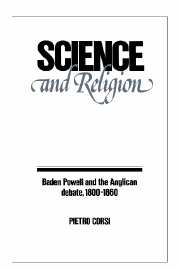16 - Species without Darwin
Published online by Cambridge University Press: 15 December 2009
Summary
Cosmology and the history of life
Between the publication of Lyell's Principles of Geology, of Whewell's History (1837) and the appearance of Baden Powell's Connexion (1838), the debate on actualism dominated discussion. The Bridgewater authors and several commentators discussed, condemned or approved the cosmological and theological implications of French natural sciences. Lyell, Whewell and Baden Powell argued on the contrary that cosmological models offered no explanation at all. The debate concentrated on the question of the possible actual causes of organic change. The cosmological approach was stigmatized as unscientific, unphilosophical and unproductive. Those who believed in Lyell's actualistic uniformitarianism were invited by Whewell to cite observable verae causae to which the changes in the present living creation were to be ascribed.
It could be argued that when Charles Darwin opened his first notebook on species in July 1837, he was to a certain extent answering the public challenge by Whewell. Whatever Lyell might have thought of Darwin's attempt to discover the secondary means responsible for the introduction of new species, Darwin believed that he was doing a service to the epistemological and geological doctrines put forward by his friend. Baden Powell too was convinced that his defence of a naturalistic explanation of the question of species strengthened Lyell's case against Whewell.
The recent, vigorous production of studies on the development of Darwin's thought makes it possible to avoid discussing his reaction to the geological, epistemological and theological debate which absorbed the attention of his colleagues in the late 1830s. The only problem which is perhaps still to be investigated is the relationship between Darwin and the French evolutionary authorities he was constantly reading during his journey.
- Type
- Chapter
- Information
- Science and ReligionBaden Powell and the Anglican Debate, 1800–1860, pp. 250 - 271Publisher: Cambridge University PressPrint publication year: 1988

